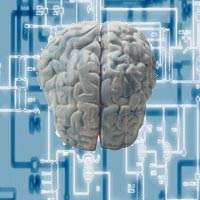You are looking at aging as a directed process and I do not.. I daresay that the bulk of evidence is on my side although of course there is no absolute proof for either. -kevin
I'm not sure if the old version of that article covers it, but the new one does. The aging process begins taking place from a very early age, near sexual maturity, some aspects I've heard start slightly before sexual maturity. This one would think is compromising fitness, and however small if so it should be selected against, unless it offered more than it took, that is unless it was a worthy trade, unless it instead increased fitness. That is the deterioration begins at a very early age, as I've said I've heard some areas begin deteriorating prior to sexual maturity, that should not be possible... unless it made the organism fitter.
The new theory posted at betterhumans, is similar to what I'm suggesting, though I do not dismiss the possibility of other mechanisms being involved.
New theory It's likely that hormonal changes do account for the diverging lifespans in an organism to some degree, the C-elegans got a six fold boost from messing with it. That seems to indicate that something else is also involved, an alternate regulation mechanism, at what level(intra-cellular, tissue, organ, etc)? Maybe it's just that this is the whole program but the C-elegans being short-lived has not evolved the maintainance/repair mechanism needed for negligible senescence, that is those of longer lived organisms or maybe it's not the whole thing.
Analysis of the genome of a negligible senescent species, and close, same genus, short-lived(they're not as short as C-elegans, some about 12yrs) species, should yield the answer. By knowing how long ago they diverged, and how many mutations are involved we would have a clue as to whether it's easy or hard to achieve negligible senescence. Further analysis would probably yield the answers to what must be done, were to direct our efforts.
Hayflick stated that aging cannot be treated by any currently marketed intervention and alluded that aging is not an evolved characteristic. - prometheus
As others have said, it's amazing Hayflick dared to use the word impossibility, IIRC, a word seldom used in scientific circles.
Maintenance is not 'relaxed' because of some requirement for evolution, it is abandoned because of tradeoffs in resource allocation towards reproduction which is very different that what you are proposing.-Kevin
I've heard of experiments that disagree with this, maybe I posted some in the aging thread, not sure though. Also, Cynthia Kenyon's said she thinks that by simply altering the hormonal mechanisms, 6 fold lifespan increase together with reproduction capacity should be possible, in C-elegans.
edit:
Just recalled... here's an example by slightly altering the C-elegans, a dauer like abnormal lifespan( not the six fold one, smaller, IIRC) was achieved without compromising fertility, mobility, strength, etc.
Here's an interesting quote:
Our laboratory studies the regulation of aging. Not very long ago, most people thought that aging was something that just happened. We just wear out, like cars. Not true! Several years ago, we discovered that mutations in the gene daf-2, which encodes an insulin/IGF-1-like receptor, double the lifespan of the nematode C. elegans. Since then, insulin/IGF-1 endocrine systems have been shown to regulate the longevity of flies and mice as well. We have found that this system is regulated by sensory neurons in C. elegans, and that signals from the reproductive system also regulate aging. Amazingly, if we perturb insulin/IGF-1 signaling and reproductive cells in the same animal, we end up with animals that live SIX times as normal! WhatÕs more, they stay vibrant and healthy until the very end. We have also discovered that a different regulatory system involving mitochondria functions during development to set the rates of behavior and aging. We are now trying to understand how the insulin/IGF-1, reproductive and mitochondrial pathways, as well as another perturbation, caloric restriction, influence lifespan at the molecular level.
pibs faculty kenyon
Edited by apocalypse, 25 August 2004 - 10:05 AM.















































